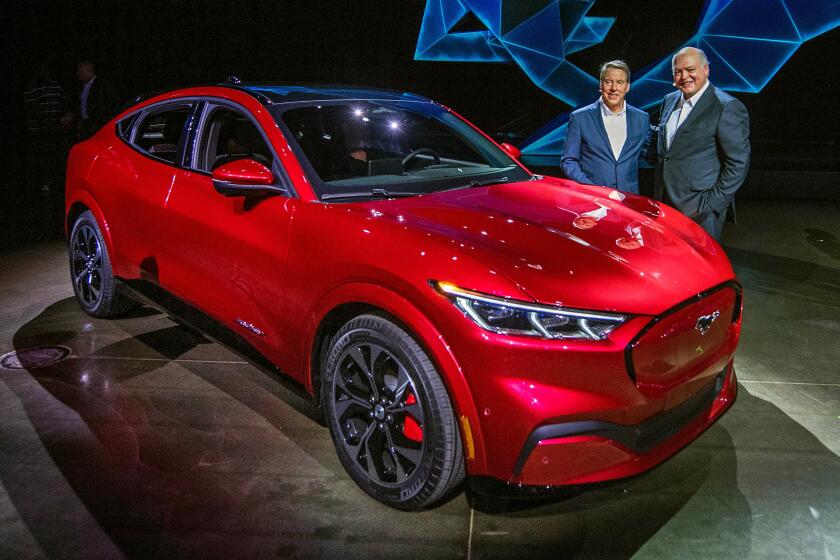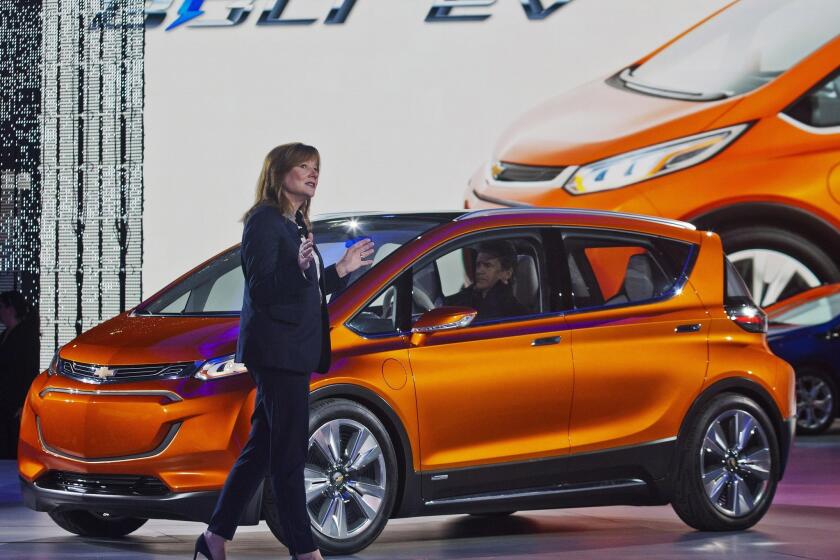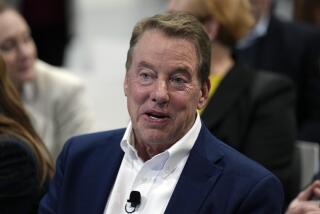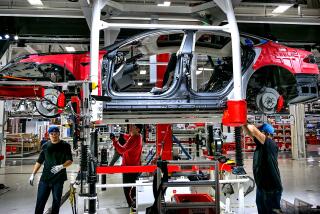Ford’s stock price tumbles as costs rise and sales slump
Ford Motor Co.’s 2020 got off to the roughest of starts, with the automaker forecasting profit well below analysts’ estimates in a sign that Chief Executive Officer Jim Hackett’s $11-billion turnaround plan may take longer to pay off.
Earnings before interest and taxes will fall to a range of $5.6 billion to $6.6 billion this year, Ford said Tuesday, trailing analysts’ average estimate of $7.4 billion. The forecast was included in the automaker’s fourth-quarter results, with adjusted earnings falling short of projections.
The company’s shares plunged as much as 9.9% to $8.29 after the close of regular trading.
Ford turns to electrified pickups, performance cars and SUVs to meet California’s greenhouse gas regulations.
Ford faces stiff spending requirements this year as it rolls out a new version of its most profitable product, the F-150 pickup, and the electric Mustang Mach-E, and prepares to revive the Bronco sport-utility vehicle for 2021. The company also continues to pour billions into self-driving cars, while trying to turn around its money-losing overseas operations. The cost of launching new models like the Explorer and rising warranty costs took a steep toll in the fourth quarter, with Ford’s North American profit margin before earnings and taxes falling by almost two-thirds to 2.8%.
“Market expectations on Ford are quite low,” said David Whiston, a Morningstar automotive analyst who rates its shares the equivalent of a buy, before the release. “They’ve got to get past the new model launch costs that could be an overhang for most of 2020. It would be a shame if we have to wait another year to really see the North American rocket take off.”
Ford’s full-year forecast assumes no change in economic conditions, and the automaker said it’s too soon to estimate the impact of the coronavirus outbreak that started in China and has now hurt production and access to the world’s biggest auto market.
Fourth-quarter adjusted earnings dropped to 12 cents a share, trailing the average estimate of 17 cents. Automotive revenue was $36.7 billion, about $100 million more than the projection. Since issuing a disappointing profit forecast in July, Ford shares had fallen about 13% through Monday’s close. Its market value is roughly one-quarter the size of electric-vehicle maker Tesla Inc.
“Our financial performance fell short of expectations,” Chief Financial Officer Tim Stone said in an interview. “It’s not OK. But we have abundant opportunities to improve our customer experience, our operational execution, drive growth and strengthen our results, particularly our free cash flow.”
It also won’t be very pretty in the first three months of 2020.
The Ram 1500 has knocked Chevy’s Silverado out of second place in pickup-truck sales.
“That’s a reflection of continuation of higher warranty costs than we experienced, particularly in the back half of last year,” as well as lower vehicle volumes, Stone said. “The warranty costs that we are seeing primarily relate to vehicles which were designed several years ago. The vehicles we have designed more recently we are seeing optimistic early trend.”
Ford’s U.S. vehicle sales have fallen the last three years as it exited the slowing sedan market and worked to update an aging lineup of SUVs. Overseas, the company is losing billions and in China sales fell by half in the last three years.
It didn’t help that the company stumbled in its launch of a key redesigned SUV. “The Explorer launch in particular did not go the way we had planned or the way we typically execute and that had a meaningful impact to us in 2019,” Stone said. Still, the vehicle was well-received, he said.
Lessons learned from that experience will help the launch of the F-150 and Bronco, he said. The Bronco won’t go to customers until 2021.
Electric vehicles can cut greenhouse gases and carmakers have big plans for them. But so far, few car buyers want them.
One bit of relief is looming: Ford said Tuesday its capital expenditures will fall as much as $800 million from 2019, to a range of $6.8 billion to $7.3 billion, in part because of its efforts to cut costs.
The company said it sees adjusted free cash flow of $2.4 billion to $3.4 billion, compared with $2.8 billion in 2019 — which itself was flat from the prior year.
Ford’s lending arm has been a bright spot, contributing about $3 billion to the automaker last year, up from $2.7 billion in 2018. Ford Credit now generates about half the automaker’s profit, helping to fund multibillion-dollar outlays in electric and self-driving cars, while also underwriting the dividend and the new models aimed at reversing Ford’s fortunes.
“They’ve got a lot of new light truck product coming,” Morningstar’s Whiston said. “And they’ve got a captive finance arm that’s still paying them money.”
More to Read
Inside the business of entertainment
The Wide Shot brings you news, analysis and insights on everything from streaming wars to production — and what it all means for the future.
You may occasionally receive promotional content from the Los Angeles Times.












